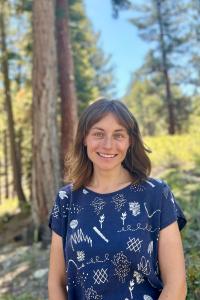Madeline Sides is a Forest Science and Management Fellow with the USDA California Climate Hub.
Madeline holds a Ph.D. from the Carnegie Mellon University School of Design. Madeline’s doctorate is in Transition Design, an emerging field of design research and practice concerning the role of design in systems-level change over long time horizons. Madeline’s doctoral research in Northern California brings ecological restoration practices into conversation with design by interrogating theories of change and imagining new ways of designing for restoration. Her research asks how we can realize socially just and ecologically sound futures through the practices of ecosystem restoration and relational repair.
Madeline integrates the socio-ecological research skills she learned as a doctoral researcher with professional experience and education in engineering and life sciences. In her professional practice, Madeline has contributed to designing numerous medical devices and led research and strategy work for life sciences, food, and healthcare organizations using qualitative and quantitative approaches to untangle complex problems. As a recent fellow with the U.S. National Park Service, Madeline contributed to climate action planning at the Golden Gate National Recreation Area. Madeline holds a B.S. in Bioengineering and an M.S. in Mechanical Engineering from Stanford University.
Featured Work
Sides, M. (2024, In Press). Toward Wild Designing: Past, Present, and Future Meanings of Design in Ecological Restoration. Environment and Society, 15.
Sides, M. (2023). Designing Transitions, Restoring Habitat: Theories of Change from the Ecosystem Restoration Community Movement. Temes de Disseny, 39.
Sides, M. (2023). Seeding Ecologies of Interventions: Relating Transition Design and Ecological Restoration. Cuadernos Del Centro de Estudios de Diseño y Comunicación, 195.


